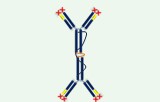In immunology, precise and reliable results are essential for advancing scientific research. One of the tools that help ensure the accuracy of immunological assays is the IgA isotype control. This type of antibody serves as a negative control to differentiate between specific and non-specific antibody binding, which is crucial in various laboratory applications such as flow cytometry, immunohistochemistry (IHC), and enzyme-linked immunosorbent assays (ELISA). By understanding the role and importance of IgA isotype controls, researchers can optimize their experimental conditions and ensure the validity of their findings.
Why Are IgA Isotype Controls Critical?
- Detection of Non-Specific Binding: IgA isotype controls help identify non-specific binding, ensuring that observed signals are genuinely due to the target antibody.
- Validation of Experimental Results: By using IgA isotype controls, researchers can validate that any biological effects observed are due to specific antibody interactions, not experimental artifacts.
- Reducing False Positives: Incorporating IgA isotype controls helps to minimize the occurrence of false positives, improving the accuracy of assay results.
- Optimization of Experimental Protocols: The use of IgA isotype controls aids in refining experimental protocols to enhance the specificity and sensitivity of assays.





